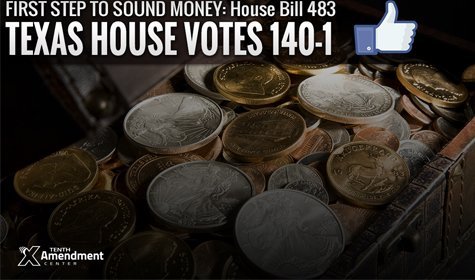AUSTIN, Tex. (May 7, 2015) – A bill taking a step towards gold and silver as commonly-used legal tender in Texas passed in the state House today by an overwhelming 140-1 vote.
Introduced by State Rep. Giovanni Capriglione (R- Southlake) and four co-sponsors on Feb. 12, House Bill 483 (HB483) would create a state bullion depository.
It reads, in part:
(a) The Texas Bullion Depository is established as an agency of this state in the office of the comptroller.
(b) The depository is established to serve as the custodian, guardian, and administrator of certain bullion and specie that may be transferred to or otherwise acquired by this state or an agency, a political subdivision, or another instrumentality of this state.
What the bill essentially does is create a means for transactions to occur in precious metals. It allows people to open an account and deposit their precious metals in the state depository. They could then use the electronic system to make payments to any other business or person who also hold an account.
This opening of the market is considered by many insiders to be the most important step towards bringing sound money to mainstream acceptance.
COMPANION BILL
HB483 works hand-in-hand with other bills filed in the state Senate this year. Senate Bill 989 (SB989) would create a bullion depository similar to HB483. Senate Bill 1245 (SB1245) goes a step further. It would re-affirm gold and silver as legal tender in the state of Texas on a voluntary basis. Under the bill, individuals would be free to “use gold or silver coin or gold or silver bullion as legal tender in this state for the payment of any private or public debt.”
These bills would help establish a system whereby people will be able to more easily conduct day-to-day transactions by gold and silver, an essential step in the promotion and use of sound money.
“The key is to make it so people can use gold and silver instead of fiat paper money,” said Michael Boldin of the Tenth Amendment Center. “Working together, these bills won’t nullify the Fed on their own, but they’re an important step forward in that direction.”
ADDITIONAL INFORMATION
Currently, all debts and taxes in Texas must either get paid with Federal Reserve Notes (dollars), authorized as legal tender by Congress, or with coins issued by the U.S. Treasury — very few of which have gold or silver in them.
But the United States Constitution states in Article I, Section 10, “No State shall…make any Thing but gold and silver Coin a Tender in Payment of Debts.”
The legislation in Texas takes a step towards that constitutional requirement, ignored for decades in every state. Such a tactic would undermine the monopoly the Federal Reserve system by introducing competition into the monetary system.
Professor William Greene is an expert on constitutional tender and said when people in multiple states actually start using gold and silver instead of Federal Reserve Notes, it would effectively nullify the Federal Reserve and end the federal government’s monopoly on money.
Over time, as residents of the state use both Federal Reserve notes and silver and gold coins, the fact that the coins hold their value more than Federal Reserve notes do will lead to a “reverse Gresham’s Law” effect, where good money (gold and silver coins) will drive out bad money (Federal Reserve notes).
As this happens, a cascade of events can begin to occur, including the flow of real wealth toward the state’s treasury, an influx of banking business from outside of the state – as people in other states carry out their desire to bank with sound money – and an eventual outcry against the use of Federal Reserve notes for any transactions.
Once things get to that point, Federal Reserve notes would become largely unwanted and irrelevant for ordinary people. Nullifying the Fed on a state by state level is what will get us there. The passage of HB483 would mark the first step toward that ultimate goal.
HB483 had previously passed through the House Investments & Financial Services Committee on April 1 by a 7-0 vote.
The bill now moves to the Senate, where it will first be assigned to a committee for consideration before the full Senate can concur and send it to Gov. Abbott’s desk.

